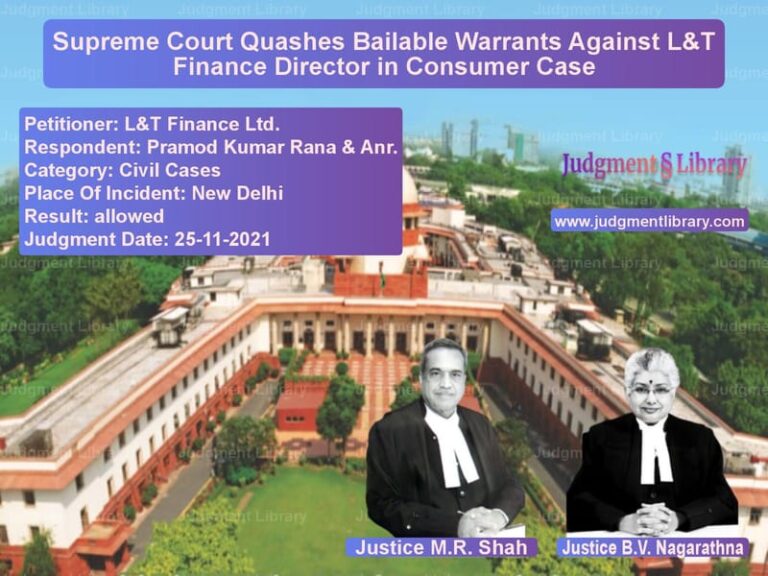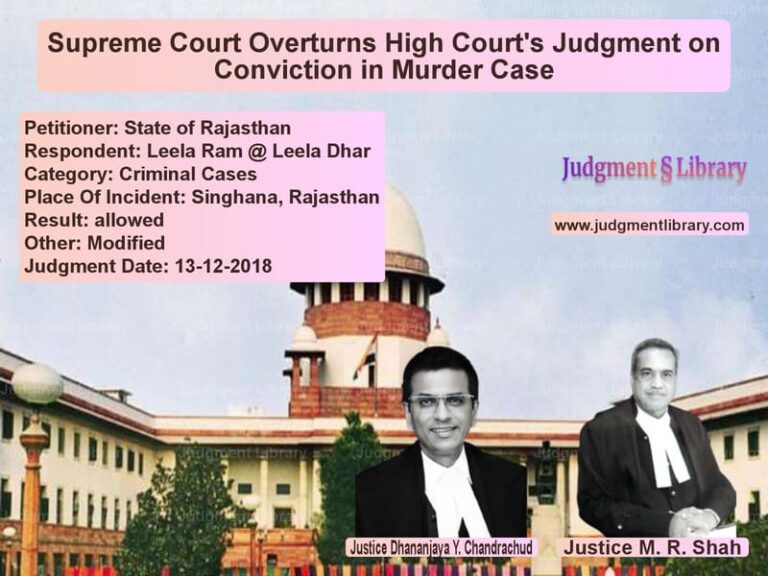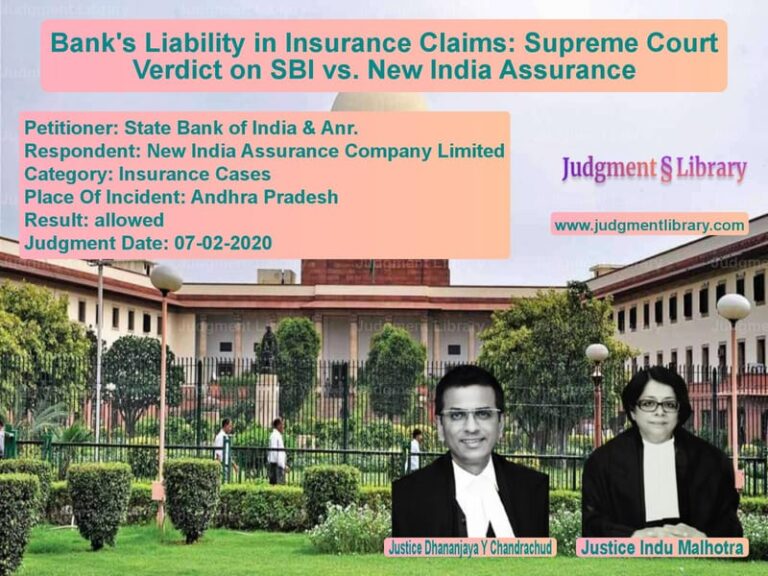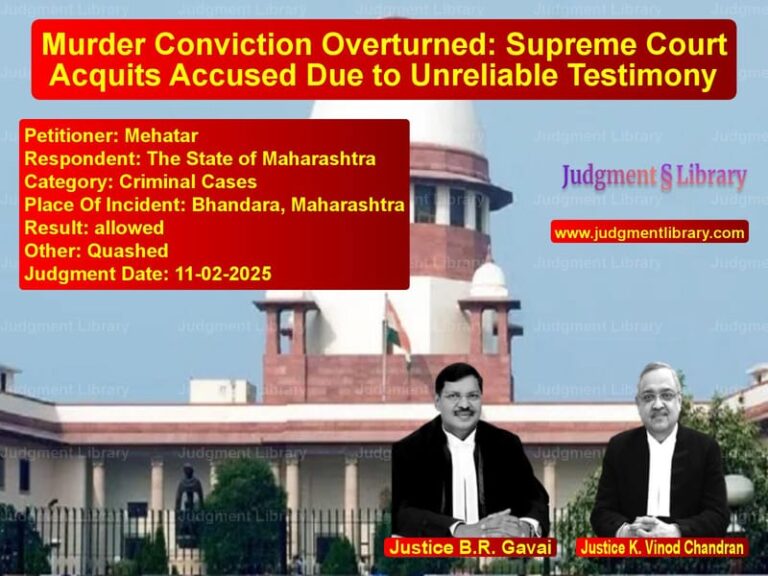Supreme Court Upholds Quashing of Criminal Proceedings in Landlord-Tenant Dispute
The case of Satish Sharma & Anr. vs. State (NCT of Delhi) & Ors. is a crucial Supreme Court ruling that addresses the use of criminal law in civil disputes, particularly in cases involving landlord-tenant conflicts. The judgment clarifies the application of Section 482 of the Criminal Procedure Code (CrPC) in quashing FIRs when a compromise has been reached between the parties. The Supreme Court upheld the decision of the Delhi High Court, which had quashed criminal proceedings based on a settlement.
Background of the Case
The case arose from an altercation on December 5, 2010, at a residential property located at C-17, New West Avenue, Club Road, Punjabi Bagh (West), New Delhi. The dispute was between the appellants and the respondents and stemmed from a longstanding landlord-tenant conflict. The incident resulted in a police complaint and the registration of FIR No. 382 of 2010 at Punjabi Bagh Police Station under Sections 323 (voluntarily causing hurt), 324 (causing hurt with dangerous weapons), 506 (criminal intimidation), and 34 (common intention) of the Indian Penal Code (IPC).
The primary complainant, Jyoti Sharma, alleged that the respondents and several unknown individuals entered her house, assaulted her and her relatives, and engaged in criminal intimidation. The accused, however, claimed that the incident was a result of a property dispute, which was later resolved through a settlement.
Legal Issues in the Case
- Whether the criminal case should be quashed based on a compromise between the parties?
- Whether the High Court erred in quashing the FIR without hearing all the injured parties?
- Whether a landlord-tenant dispute could form the basis of criminal proceedings?
Arguments Presented
Appellants’ (Satish Sharma & Anr.) Arguments
- The appellants, who were injured in the incident, were not made parties in the High Court proceedings where the FIR was quashed.
- The compromise agreement was reached only with one of the injured parties and not all the complainants.
- The High Court failed to consider that the appellants were not consulted before quashing the FIR.
Respondents’ (Accused’s) Arguments
- The dispute was primarily a landlord-tenant issue, which had been resolved amicably.
- A Deed of Compromise was executed on May 30, 2011, and all involved parties had agreed to withdraw complaints.
- The appellants had received Rs. 25 lakhs as part of the settlement.
- The criminal case was being used as a tool for harassment and should not be allowed to continue.
Supreme Court’s Observations and Judgment
1. Landlord-Tenant Dispute Not a Criminal Offense
The Supreme Court reiterated that property-related disputes should not be criminalized unless clear evidence of a criminal offense is present. The Court observed:
“The dispute originated from a landlord-tenant conflict, which has been resolved through a settlement. Allowing criminal proceedings to continue in such cases would amount to an abuse of legal process.”
2. Importance of Section 482 CrPC in Quashing FIRs
The Supreme Court reaffirmed the principles laid down in Gian Singh vs. State of Punjab (2012) and Narinder Singh vs. State of Punjab (2014) regarding the quashing of criminal proceedings in the interest of justice. The Court stated:
“The High Court rightly exercised its jurisdiction under Section 482 CrPC, as the continuance of criminal proceedings would serve no purpose after the parties had settled their dispute.”
3. Role of Compensation in Criminal Settlements
The Court noted that the complainants had accepted a monetary settlement of Rs. 25 lakhs, which further justified the quashing of the FIR. It ruled:
“Where parties have voluntarily entered into a compromise and monetary compensation has been paid, courts must recognize the finality of such settlements.”
4. Appellants’ Presence in High Court Proceedings
The Supreme Court dismissed the appellants’ argument that they were not heard in the High Court. The Court observed that one of the appellants, Deepak Bhardwaj, was present as counsel for the complainant and did not object to the settlement at that stage. It ruled:
“The appellants had full knowledge of the proceedings in the High Court and did not challenge the settlement at the time. Their subsequent challenge appears to be an afterthought.”
Final Judgment
The Supreme Court:
- Upheld the Delhi High Court’s decision to quash the FIR.
- Ruled that the settlement agreement was valid and binding on all parties.
- Held that criminal law should not be used to settle civil disputes between landlords and tenants.
- Dismissed the appellants’ plea, stating that they had already accepted the settlement benefits.
Legal Implications of the Judgment
This ruling has far-reaching implications for cases involving property disputes and landlord-tenant conflicts:
- Preventing the Misuse of Criminal Law: The judgment reinforces that civil disputes should not be converted into criminal cases.
- Strengthening the Role of Compromise in Criminal Law: Courts may quash FIRs when parties reach a genuine settlement.
- Clarifying the Scope of Section 482 CrPC: The ruling affirms that High Courts can quash FIRs in cases where criminal prosecution is unnecessary.
- Reducing Court Backlog: The decision helps lower the burden on courts by dismissing frivolous criminal complaints.
Conclusion
The Supreme Court’s ruling in Satish Sharma & Anr. vs. State (NCT of Delhi) & Ors. is a landmark judgment that emphasizes the importance of distinguishing between civil and criminal disputes. The decision ensures that criminal law is not misused in cases where a settlement has been reached. By upholding the High Court’s quashing of the FIR, the Supreme Court has reinforced the principle that legal proceedings must serve the ends of justice rather than being used as a tool for harassment.
Petitioner Name: Satish Sharma & Anr..Respondent Name: State (NCT of Delhi) & Ors..Judgment By: Justice Abhay Manohar Sapre, Justice Dinesh Maheshwari.Place Of Incident: New Delhi.Judgment Date: 07-02-2019.
Don’t miss out on the full details! Download the complete judgment in PDF format below and gain valuable insights instantly!
Download Judgment: Satish Sharma & Anr. vs State (NCT of Delhi) Supreme Court of India Judgment Dated 07-02-2019.pdf
Direct Downlaod Judgment: Direct downlaod this Judgment
See all petitions in Fraud and Forgery
See all petitions in Legal Malpractice
See all petitions in Judgment by Abhay Manohar Sapre
See all petitions in Judgment by Dinesh Maheshwari
See all petitions in dismissed
See all petitions in Quashed
See all petitions in supreme court of India judgments February 2019
See all petitions in 2019 judgments
See all posts in Criminal Cases Category
See all allowed petitions in Criminal Cases Category
See all Dismissed petitions in Criminal Cases Category
See all partially allowed petitions in Criminal Cases Category







